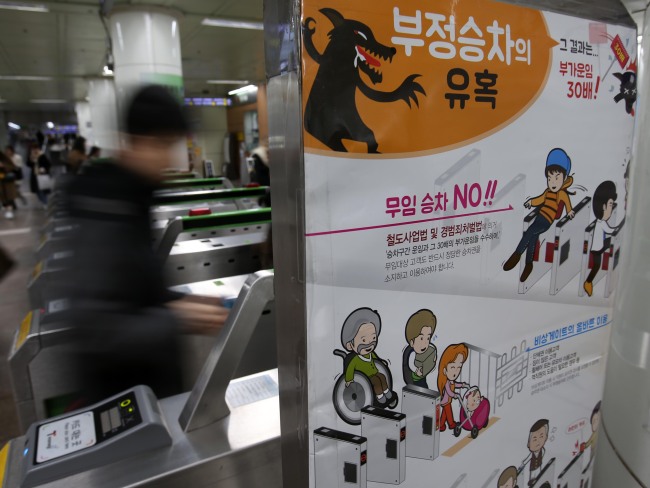 |
| A passenger tags his metro card at the subway station in Seoul on Tuesday. (Yonhap) |
For Kim Eun-ji, a 26-year-old woman living in a Seoul suburb, checking if anyone approaches her at subway turnstiles has become a habit.
“I’m worried if someone will again ask to bypass the turnstiles together. An old lady once asked if she could walk through the turnstile when I tagged my metro card. It was ridiculous, but it happened so quickly,” Kim said.
Despite Seoul City’s efforts to curb illegal subway rides by charging a fine of 30 times the original fare, such rides are on the rise, the city said Tuesday.
According to Subway Lines Nos. 1-4 operator Seoul Metro, more than 21,431 passengers illegally hopped on trains last year, paying 794 million won ($657,000) in fines. In 2014, the number of illegal riders stood at 14,538.
By routes, Subway Line No. 2 topped the list with 12,771 illegal rides, followed by No. 4 (4,808), No. 3 (2,743), and No. 1 (1,109). By stops, Hongik University Station saw the highest number of illegal rides with 1,533.
As for methods used, passengers bypassed the turnstiles without tagging a metro card, illegally went through the special turnstile designed for the handicapped or tagged someone else’s metro card.
“I know it is wrong, but it’s only a few bucks,” said a 62-year-old woman who admitted to having used her 66-year-old husband’s free metro card from time to time.
Seoul Metro said the number of passengers using the metro card of a spouse or family member issued for elders, handicapped or students is on the rise, and the hardest to crack down on.
“Senior passes, only distributed to citizens 65 years or older, are frequently used by elderly people at a younger age, or even by their grandchildren.
But we can only identify the use of the senior pass when the red light turns on as the pass is tagged at the turnstile, while we cannot ask for the age of the pass holder every single time,” an official surnamed Lee at Seoul Metro told The Korea Herald.
“Since we are neither the police nor have official right to interrogate passengers, clashes frequently break out between subway staff and illegal riders,” Lee added.
Seoul commuters have also been critical of the high cost and congestion of the subway, saying focus should instead be placed on better preventing free riders.
According to the report released Monday by city-run think tank the Seoul Institute, 724 billion won worth of extra burden is needed each year to manage Seoul’s subway operations during times of congestion.
To reduce the burden, Seoul’s subway operators should consider adopting a differential fare system, charging passengers more during peak times, the report suggested.
Ban Ah-hyun, 27, who travels to the crowded Gangnam area for work daily, objected to the measure.
“Why should passengers who already pay the full subway fare embrace the burden? I already spend at least 150,000 won on my monthly transportation expenses. I think the city can make more money by collecting fines from illegal riders.”
An official surnamed Seo at Seoul Metro said although adopting the different fare system is an option, they were aware of negative repercussions.
“We agree that it is nonsense that frequent subway riders have to pay more (according to the differential fare system). We will review the idea and its feasibility,” Seo said.
By Kim Da-sol (ddd@heraldcorp.com)

